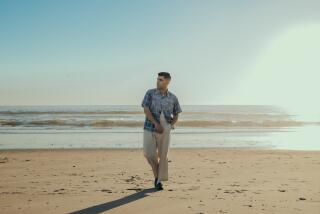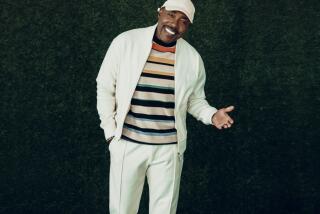Guitarist Jeff Parker leaves his comfort zone in relocating to L.A.
Los Angeles can be tough on newcomers, particularly among musicians. A key figure in the fertile Chicago jazz scene and member of the groundbreaking indie band Tortoise, guitarist Jeff Parker is midway through a relocation to L.A. that has found him straddling two cities during the last few months.
Though Parker never wanted for gigs in a city that found him collaborating with musicians who included the late saxophonist Fred Anderson, vibraphonist Jason Adasiewicz and flutist Nicole Mitchell, Los Angeles has proved to be a bit of a challenge so far.
“There’s so many great musicians out here, man.... You know, I haven’t quite been able to figure out exactly how things work,” he admitted, speaking by a hands-free phone connection while driving through Highland Park. “Because it seems like it’s not as much of a live music scene out here in Los Angeles [as in Chicago].... I’m sure I could be wrong, but it seems like there’s not as many places to play.”
PHOTOS: Top 10 jazz albums of 2012
Still, with the help of some West Coast connections, including Wilco guitarist Nels Cline (who recently relocated to New York after many years as a crucial part of the L.A. scene), Parker is getting acclimated. He has appeared a number of times at the Little Tokyo club the Blue Whale in bands led by clarinetist Ben Goldberg, saxophonist Chris Speed and drummer Scott Amendola, and Thursday he headlines with his own trio.
Though Parker is still between two cities until sometime in the fall, he’s found that his opportunities have increased since he stepped out of his comfort zone. He performed at New York City’s Village Vanguard in a group with drummer Jeff Ballard, and last week with Jason Moran and the Bandwagon in the group’s buzzed-about pairing with live skateboarding at the SFJAZZ Center in San Francisco. Though grateful for the new opportunities as he leaves a scene he’s been immersed in for 20 years, he’s also a bit taken aback.
“I didn’t really have a bigger perspective as far as how my music was getting out into the world,” he said. “I came out here, and I’m definitely surprised there are people who are familiar with the things that I’ve done.”
Relocating to L.A. was mostly due to family reasons (his partner is a filmmaker and teacher at California Institute of the Arts), but Parker says the move was also driven by artistic motives. “I just found myself playing with a lot of the same people over and over again,” he said. “I mean, the scene [in Chicago] is amazing, but it kind of felt like I was getting a little complacent.”
If Parker was in a rut, it didn’t come across in his recordings. In addition to numerous recordings as a sideman, he released his third album under his own name in 2012, “Bright Light in Winter.” The record, a collaborative effort with his longtime bassist Chris Lopes and drummer Chad Taylor, is marked by Parker’s distinctively sharp, deliberate tone.
“It’s a band. Those guys write as much music for the group as I do,” he said. “I put my name out front because in jazz that’s what people expect you to do.”
That push-and-pull between Parker and his jazz roots is a bit of an ongoing issue. Relocating from New England to Chicago in the early ‘90s, Parker performed around the city’s straight-ahead jazz scene before falling in with the members of Tortoise. Driven by a desire to kick against the limitations both he and the band saw in musical genres, Tortoise melded elements of electric jazz, dub and krautrock into a unique, all-instrumental sound that was informed by jazz and improvisation but not entirely part of it.
Though Parker’s music outside of the group could easily be filed as jazz, particularly as the music’s definition has undergone a welcome expansion in recent years, the guitarist still feels some ambivalence about the label.
“You know, I started playing because I love jazz. It was the first music, the first sound that made me want to become a musician,” Parker said. “I would say [my music] comes from that, from jazz, but it’s definitely not bound by it.
“I don’t consider myself a jazz musician. But it’s where I come from.”
More to Read
The biggest entertainment stories
Get our big stories about Hollywood, film, television, music, arts, culture and more right in your inbox as soon as they publish.
You may occasionally receive promotional content from the Los Angeles Times.











